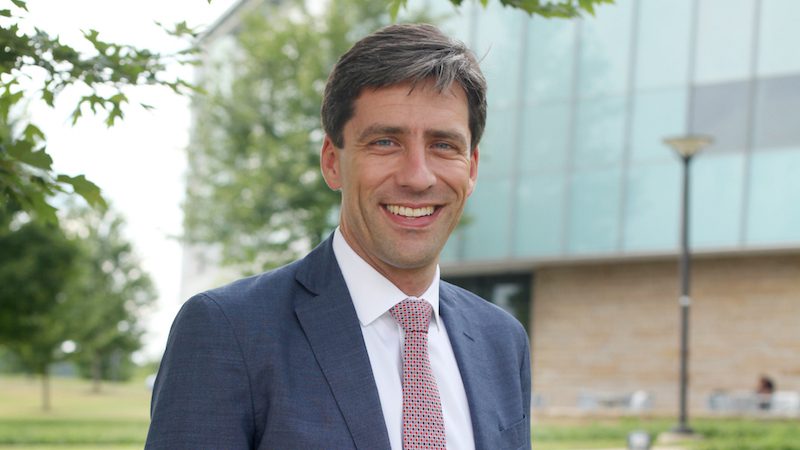Alumnus, First Amendment Scholar Discusses Separation of Church and State

Politicians declare it, pundits argue it and pollsters measure the number of Americans who claim the United States is a Christian nation.
But to Furman alumnus Mark Storslee ’05, the First Amendment of the Constitution is clear. “Government should be neutral with respect to people’s religious decisions. The goal of the First Amendment is not to maximize religion or minimize religion, but instead to allow each person to decide religious matters without government’s thumb on the scales,” he said.
Storslee, a First Amendment scholar and an associate professor of law at Emory University, made that point clear March 18 when he met with students, faculty and staff. He gave a CLP talk in Daniel Chapel in which he shared insight based on considerable experience. After Furman, Storslee earned master’s degrees from Duke and the University of Edinburgh, a doctoral degree in religious ethics from the University of Virginia, and a law degree from Stanford. He clerked for the U.S. Court of Appeals and the U.S. Supreme Court.
When Storslee came to Furman as a first-year student from his home in Bismarck, North Dakota, he didn’t have clear career aspirations, but the intellectual energy on campus drew him in. “Furman has always been about students who ask big questions, who think about ‘who am I, and what does the world need,’ and to think about how to fit into those big questions,” he said.
His big questions eventually focused on the relationships between religion and politics, and how “people of different religions live out their beliefs. Not just Christians, but Jews, Muslims, and others.”
He relished Furman’s diversity, and the people he met “who had different experiences, from different races, different religions. And we were all here together to be part of the same community. It was really neat.”
Diversity, he said, “helps all of us learn more about the world, learn more about each other, to see the complexities, to see things about who we are as Americans that maybe we didn’t understand as well before.”
In the CLP, Storslee spoke to a crowd of mentors, former professors and a healthy gathering of students. He broke down the First Amendment and focused on the language of the Religion Clauses that’s the sweet spot of his career: “Congress shall make no law respecting an establishment of religion, or prohibiting the free exercise thereof.”
Afterward, Storslee was asked if he was concerned about Christian nationalism.
“The rise of Christian nationalism is a huge concern,” he said. “That our nation was influenced by Christian ideas is just a historic fact. But it is not a Christian nation.”
The relevance of Storslee’s work and the timeliness of his visit were apparent, but Helen Lee Turner, professor of religion, said the topic is not just a national issue.
“As Furman addresses issues of diversity and free speech, I think it is important for us as a community to think about the First Amendment and what it means in an era when the meaning of free speech is highly contested. The same is true of the boundaries between church and state,” said Turner, who arranged Storslee’s trip.
Below are a few thoughts Storslee shared before his CLP. They have been edited for brevity and clarity.
I don’t think the Constitution is pro-religion or anti-religion. The Constitution is pro-religious freedom. I think the Constitution is pro leaving that sphere of life to private choice as much as it can be.
One way that plays out today is in the context of school prayer. A lot of people have asked what’s wrong with school prayer if the government exempts kids who don’t want to participate.
I think the way the Founders saw it was that government doesn’t have the power to require people to worship when the government wants or how the government wants. That’s just not something the government can do.
Another area where these ideals are playing out is the Supreme Court’s recent decisions about funding for religious schools. People thought for a long time that the Establishment Clause (Congress shall make no law respecting an establishment of religion) meant there could be no government funding of religious schools because they were religious. But you might say that’s a penalty on religious practice. It discourages religion by making it harder for those schools to operate just because they’re religious.
I think (religious freedom) is always in jeopardy. Different people want different things. Religion is extremely powerful. It makes some people do some very good things, it does some things that I think people sometimes find objectionable. People have very strong feelings about religion.
There is always controversy about how our government relates to religion, and how our politics is inflected with religion or not. I’m not sure if it was different then than now.